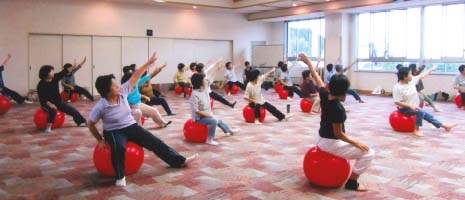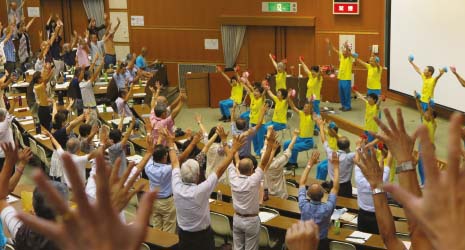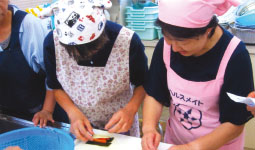Home > Highlighting JAPAN > Highlighting Japan September 2018 > A Society of Health and Longevity
Highlighting JAPAN


Long Live Shiga: The Secrets to Japan’s Longest Lifespan for Men
Just two decades ago, Shiga Prefecture ranked in the middle in terms of average lifespan for men in Japan. By tackling health issues at an early stage through better diet, lifestyle and other initiatives, however, the prefecture now boasts a male population having Japan’s longest average lifespan. Here are Shiga’s secrets to longevity.
With men living an average of 81.09 years and women up to 87.26 years, Japan is recognized as a long-lived nation. According to the latest statistics for human lifespan per prefecture, the average age of men in Shiga Prefecture—situated east of Kyoto in the Kansai region—was 81.78 years old, number one in the nation. Shiga’s women came in at 87.57 years old, ranking fourth. Along with the average age of Shiga residents rising drastically in recent years, their healthy life expectancy has also improved and is currently second in Japan for men at 80.39 years, and third for women at 84.44 years.
Shiga has been working endlessly to create a healthier society for the past twenty years. “After researching the health and eating habits of Shiga residents, we found that many people do not smoke or consume high volumes of alcohol, and exercise on a regular basis,” says Eiji Inoshita, chairman of promoting healthy life expectancy and the director of the Shiga Prefectural Institute of Public Health. “We understood the strong connection between daily lifestyle and the healthy life expectancy and average lifespan of people. According to recent government research, unemployment and the number of elderly living alone are low here, which creates a good environment for people wanting to live a healthy lifestyle.”
Smoking has also been seen to have a great impact on health, Inoshita acknowledges. “The prefecture has been pushing initiatives to reduce the number of smokers by educating children from the elementary level to high school about the risks of smoking,” he notes. “Thanks to this movement, compared to ten years ago the number of smokers in their twenties and thirties has gone down. So have the number of deaths caused by lung cancer and chronic obstructive pulmonary disease.”
Unlike other prefectures, Shiga has a host of volunteer organizations and health advocates promoting healthy lifestyles and activities. Towns and cities have joined forces to train community health advocates who then inform people about the importance of a balanced diet, offer cooking classes and perform special medical check-ups. Community health advocates also take preventive measures against what’s known as “locomotive syndrome”—a condition in which mobility becomes limited and raises the risk of being bedridden. Summer and winter in Shiga offer mild weather, which allows people to enjoy sports and activities like walking or jogging in natural areas near Lake Biwa year round.
To extend healthy life expectancy and to keep the elderly energetic, they have joined forces with Shiga Lacadia University to help local communities. Residents over the age of sixty learn about gardening, regional culture and health promotion; after they graduate, many contribute to their community as town planners or volunteer guides. When the people of Shiga have a goal, they have a tendency to work together to achieve it, and take part in events related to health or work as volunteers. As Inoue says, “The people’s honest nature has been producing many positive effects.”
Since 2014, healthy life expectancy advocates in Shiga have been raising awareness on ways to make people healthier and live longer through the Healthy Life Expectancy Project. They’ve been awarding organizations taking action to build a healthy environment and publicizing them.
Shiga’s proactive and practical actions have not passed unnoticed, so representatives from other prefectures have come to observe Shiga's tactics for extending the average lifespan and healthy life expectancy.
“We plan on cooperating with local businesses and universities to make a healthier environment for not only seniors and children, but also for the working generation,” says Inoue. “We can’t be satisfied with our current results. I’m also hoping to further disseminate the factors and secrets of healthy longevity, how to maintain it, and analyze it more thoroughly and spread it nationwide.”
© 2009 Cabinet Office, Government of Japan







